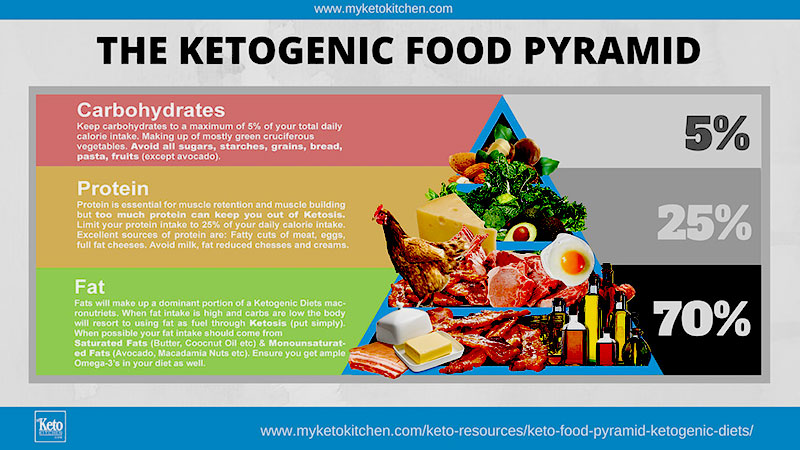
The Ketogenic diet is one of the select eating plans backed by extensive scientific research. It is a low-carb, high-fat diet which aims to boost Ketogenesis, the biochemical process that leads to increased production of ketones bodies through the breakdown of the body’s fat reserves. Originally developed by Dr. Russell Wilder in 1921 for treatment of drug-resistant epilepsy in children, the Ketogenic or Keto diet has evolved into a widely used plan for weight-loss. The diet operates on the premise that the body performs better when it obtains energy from burning stored fat rather than sugar from food.
The average diet places glucose as the primary energy source of the body. But because the body cannot store it, excess glucose in the bloodstream is converted to fat. However, this stored fat is unavailable to the body because insulin, which is necessary for the metabolism of glucose, prevents it from entering the bloodstream. With the result that when the body runs out of glucose, it triggers feelings of hunger, causing the person to eat. The process then repeats as the flood of glucose from the meal is used up or stored as fat, until over time fat cells build up in the body and result in obesity.
A Ketogenic diet reverses this process. The Ketogenic Diet does not try to force the body to fall back on its fat reserves by starving it of food altogether. Rather, it limits intake of carbs, the body’s main source of glucose. As a consequence of reduced intake of carbs, insulin levels in the blood also falls, since there is insufficient glucose to be metabolized. Reduced insulin allows fat cells to enter the bloodstream, from where they are transported to the liver and transformed into ketones. The Ketones released via this process is used to fuel the body. Additionally, through a process known as Gluconeogensis, the body converts fat and protein into carbs for fuel.
There are four kinds of Keto diet depending on the needs of a person.
- The Standard Ketogenic Diet or SKD is the classic Ketogenic diet and what most people have in mind when they talk about Keto. It is a very low-carb, moderate-protein, high-fat diet; meals typically contain 5% carbs, 75% fat, and 20% protein.
- Targeted Ketogenic Diet or TKD deviates slightly from the standard diet; the person mostly follows the SKD regime but is allowed to add small amounts of quick-digesting carbs before periods of exercise.
- Cyclical Ketogenic Diet or CKD is a more complicated variety mostly used by bodybuilders. It allows periods of higher-carb refuel, such as, 5 days of SKD and 2 days of high-carb.
- High-Protein Ketogenic Diet is the standard Ketogenic diet with larger amounts of protein, such as 5% carbs, 60% fat and 35% protein.
Pros and Cons of the Ketogenic Eating Plan
Pros
- A person on the Ketogenic eating plan will not have food cravings like they may with other diets.
- The Ketogenic diet offers many alternatives for the things people are accustomed to eating. As a result, there is no feeling of food deprivation.
- The Keto diet is filling and the person does not struggle with constant feelings of hunger.
- A Keto diet prevents resurgence of appetite after weight loss, usually the primary reason for weight regain.
- Weight-loss via a Ketogenic diet minimizes muscle loss.
Cons
- The risk of ketoacidosis, which may result from excessive production of Ketones.
- Low energy and general lethargy during the first week of Keto, due to loss of electrolytes.
- The person may experience cramps and constipation as a result of losing too much fluid.
- Keto flu – a combination of fatigue, headaches and nausea – is a common side-effect
- Heart Palpitations; some persons will experience irregular heartbeats
Sports That Benefit From A Keto Diet Plan
People who are involved in sports on a regular basis may worry how a Keto diet will impact on their performance. As with all other dietary changes, the body will experience a transition period during which it tries to adjust to the new system.
During this time, there may be a small drop in performance. This soon disappears, however, and performance returns to pre-diet levels.
A Keto diet has been found to be helpful in endurance sports and bodybuilding. Long distance runners, professional cyclists, basket ball and baseball players can all benefit from a Ketogenic diet.
Cyclical and Targeted Ketogenic diets have been found to be especially beneficial for professional athletes and other sports enthusiasts.
Foods Allowed or Disallowed In A Ketogenic Diet
Allowed
- Meat
- Fatty fish
- Eggs
- Butter & cream
- Unprocessed cheese
- Nuts & seeds
- Healthy oils
- Low-carb veggies
Disallowed
- Sugary foods
- Grains & starches
- Fruit
- Beans
- Root vegetables & tubers
- Low-fat products
- Sugar-free diet foods
- Processed vegetable oil
- Alcohol
Medical Benefits of a Ketogenic Diet
- Diabetes: A Ketogenic diet has been found to help people suffering from Diabetes. Those benefits are linked to fat reduction improvement in insulin sensitivity. Some diabetics have gained enough benefits that they were able to go off diabetes medications.
- Heart Disease: A Keto diet also has a positive impact on Triglyceride levels, HDL cholesterol levels, blood pressure and blood sugar, all risk factors for heart disease.
- Epilepsy: The Keto diet causes massive drops in the number of seizures experienced by epileptic children, especially drug-resistant epilepsy.
- Others: Ketogenic diets have also been employed in the treatment of cancer and found to aid faster recovery in brain injury.
Famous Athletes On The Ketogenic Diet Plan
- LeBron James: professional basketball player for Los Angeles Lakers in the NBA
- Kobe Bryant: Former professional basketball player Los Angeles Lakers
- Tim Mannah, Captain of the Parramatta Eels, Australia
- Chloe Kim; Gold medalist in women’s half-pipe; Pyeongchang 2018, South Korea
- Tim Tebow: Professional American football quarterback (formerly) and Professional Baseball Outfielder (presently)
Medical Studies Backing The Ketogenic Diet
A 2007 study in the Churchill Hospital, Headington, Oxford, UK determined that a low-carbs diet was equally effective for weight reduction in diabetic and not-diabetic persons.
In 2008, the New England Journal of Medicine published a study of 322 obese individuals which showed that a low-carbs diet was more effective for losing weight than a low-fat diet.
88 individuals with abdominal obesity were randomly assigned to a low-carb or a low-fat diet for 24 weeks. At the end of the study period, the low-carb group had lost more weight. This study was published in the Journal of The American College of Cardiology in 2008.




